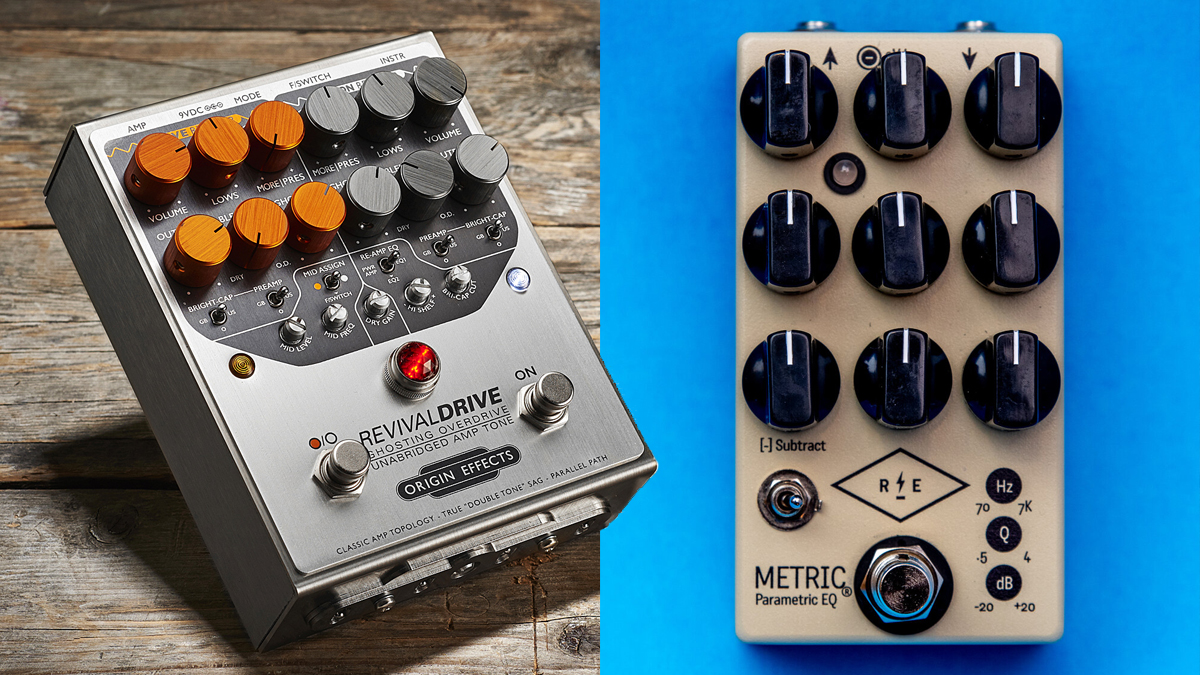Origin Effects accused of attempting to “strip” Revival Electric of its name
A trademark battle has erupted over Origin Effects’ RevivalDRIVE pedal

All the latest guitar news, interviews, lessons, reviews, deals and more, direct to your inbox!
You are now subscribed
Your newsletter sign-up was successful
UPDATE: Origin Effects has now responded publicly to what it says are “inaccurate reports.” The company's full statement can be read at the bottom of this article.
Travis Harris, founder of Bay Area pedal and amp company Revival Electric, has accused UK boutique builder Origin Effects of attempting to “strip” his company of its name.
The legal battle stems from Origin’s attempt to trademark its RevivalDRIVE pedal – a mark that was allegedly denied by the United States Patent and Trademark Office (USPTO).
An Instagram post from Harris, shared on June 16, laid out his allegations.
“About 18 months ago, Origin Effects blindsided me with legal action after they found out their RevivalDRIVE pedal was denied for a trademark,” the post reads.
“With a team of lawyers, they have filed false allegations to get the trademark office to strip me of this name [Revival Electric], even doubling down during the peak of the pandemic with more malicious and aggressive claims.
“In my opinion this is all an attempt to help shield them from potential lawsuits since they are illegally using Revival, which infringes on my registered [trademark].”
All the latest guitar news, interviews, lessons, reviews, deals and more, direct to your inbox!
“This week they are forcing me to give a 7 hour deposition (aka interrogation by their attorneys) in their latest attempt to drum up any evidence. They are using the law to inflict as much undue burden as possible in order to exhaust me and escape any consequences for their illegal actions.”
A post shared by Revival Electric® (@revivalelectric)
A photo posted by on
USPTO documents dated November 20, 2019 confirm Harris’s claim that Origin Effects petitioned for the cancellation of Revival Electric’s mark, which was first registered in 2010.
On July 10, 2018, Origin applied for registration of the mark ‘REVIVALDRIVE’, but this was rejected on November 5, 2018, on the grounds of confusion with the ‘REVIVAL ELECTRIC’ mark. Despite Origin’s argument there was “no likelihood of confusion between the marks”, the refusal to register was reinstated.
The UK firm’s court documents go on to argue that the ‘Revival Electric’ mark “has been discontinued with intent not to resume use” and should therefore be cancelled.
This was based on an inability to purchase products from Revival Electric’s website, a lack of social media activity, and inability to contact Harris, as summarized in investigations by Origin.
Harris claimed this period of inactivity was due to a global shortage of a key component for pedal manufacture, and he had continued to use the mark to advertise services and products during this time.
Latest court documents, dated May 17 2021, set out proceedings continuing well into 2022.
Origin Effects launched the RevivalDRIVE in 2018, and followed up with a number of variations, including Compact and Hot Rod iterations, as well as the RevivalTrem.
Origin Effects commented publicly on Revival Electric’s statement today. Founder Simon Keats’ statement read:
A post shared by Origin Effects (@origineffects)
A photo posted by on
“As the founder of Origin Effects, I have been saddened by the recent events that have led to inaccurate reports on social media about our trademark dispute.
“This situation is not as portrayed, a case of “big fish, little fish”. Origin Effects is a small, relatively new company of guitar enthusiasts. We employ 11 people in a small market town in the English midlands. We are not a huge corporation with a team of lawyers.
“Trademarks are part and parcel of running and protecting a growing business. This brings a level of complexity that inevitably creates friction from time to time. In our industry, by and large, people are pragmatic, and conflict can be avoided. One such situation has been framed by Revival Electric to portray us in a poor light. I want to assure you that, as always, there are two sides to every story.
“When our trademark application in the USA was rejected, we followed standard protocol, with the aim of either rebranding or finding a co-existence agreement where both parties happily operate alongside each other. Our repeated efforts to make contact with Revival Electric yielded no response. Given that Revival Electric’s website appeared to be dormant, we felt it was reasonable to continue with efforts to register the name.
“Only by starting a formal process were we able to make contact with Revival Electric, at which point we attempted to negotiate a settlement, including an offer to rebrand our products. Unfortunately, things escalated beyond our control when Revival Electric demanded royalty fees on all sales of Revival products that we were unable to meet. We felt that Revival Electric were attempting to unscrupulously profit from their trademark. With the threat of legal action against us, we had no choice but to continue with the US trademark dispute system for a resolution. There is no lawsuit against Revival Electric.
“These facts have been omitted from Revival Electric’s portrayal of events.
"I want to say a huge thank you to all our fantastic customers and artists around the world; your continued support means a great deal during this difficult time.”
Since 1980, Guitar World has been the ultimate resource for guitarists. Whether you want to learn the techniques employed by your guitar heroes, read about their latest projects or simply need to know which guitar is the right one to buy, Guitar World is the place to look.

